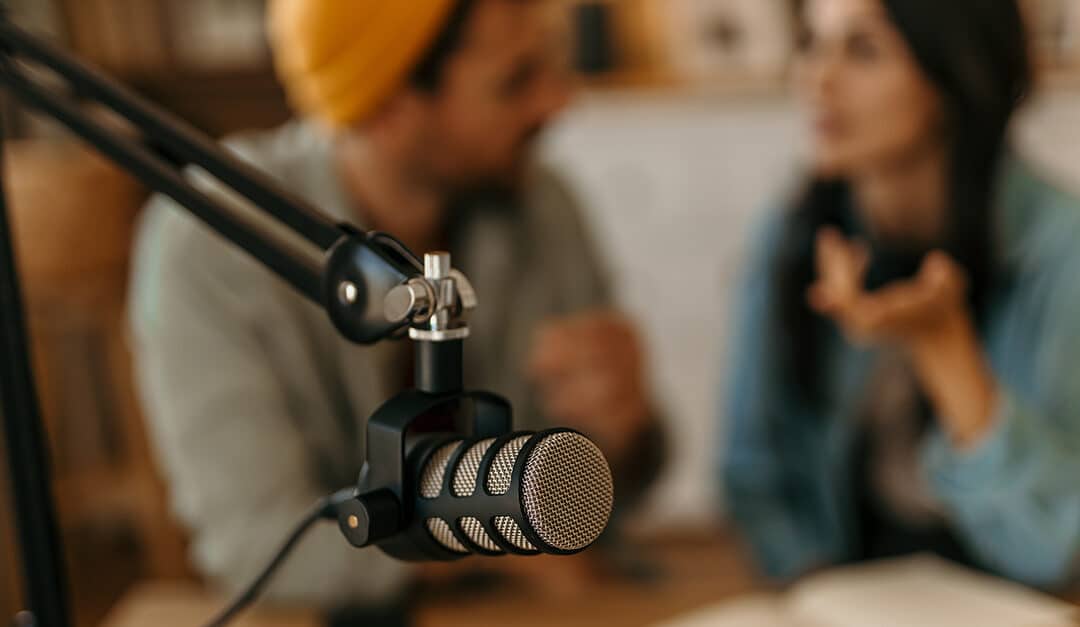Are you looking for a cool way to learn Portuguese? Well, look no more! You’ve arrived at the right place! Here at TruFluency we understand the importance of keeping practicing Portuguese after your classes. Language learning should continue after school to strengthen your Portuguese skills.
Uf! Do I really have to sit down after a long day at work and language classes and keep studying? No, you don’t! We know that can be super tiring. You can simply add Portuguese learning to your daily routine through fun or common activities.
For example, put on some Portuguese songs in the background while you cook or do the laundry. Or read a book in Portuguese before going to sleep. Or, yes, you guessed it: listen to a Portuguese learning podcast!
This last one is a great option to keep learning the language outside the class and in a more relaxed way. You’ll reinforce your grammar, listening, vocabulary, pronunciation and, overall, your Portuguese language skills!
So, if you love podcasts, check out our top 5 podcasts for learning Portuguese. You won’t regret it!
1. Portuguese Lab
You probably recognize this title from our best YouTube channels to learn Portuguese blog. Well, guess what? They also have a podcast and it’s as good as their YouTube videos.
The Portuguese Lab podcast is perfect for European Portuguese beginner learners. Their goal is to help you achieve fluency and improve your listening comprehension. You’ll also learn tons of grammar and vocabulary, which will inevitably help you to speak more like a native.
To do that, many episodes start with a dialogue or small conversation. Then, they’ll break it down to you. That is, they’ll explain you part by part of the dialogue, more specifically they’ll translate it to English for you. So you can understand everything. They’ll also teach you the vocabulary used in that dialogue, so you learn it.
As the episode goes by you’ll learn more words and phrases, especially related to the dialogue heard in the beginning. So, for example, if the podcast episode is about ordering food, you’ll learn how to do that with the examples shown throughout the episode. In the end you’ll have a longer dialogue, almost like a small story. Little by little you’ll become able to hold a conversation.
This is a great way of teaching. Because you’ll learn through context how to use the vocabulary correctly and not just by memorizing a list of words. Think about it this way: It’s like learning through real-life situations.
Believe us when we tell you, topics are super useful for your daily life. You’ll learn things like the differences between “porque” and “porqué”, answering the phone in Portuguese, vocabulary for the airport, and much more.
Here’s a huge plus: They have transcripts for each episode! So if you’re a complete beginner and need more visual help, you can read the transcript while listening to it. This will also help you learn the writing of the words.
It has 5 stars on Spotify and 4.8 on Apple Podcasts.
2. Speaking Brazilian Portuguese
Virginia Langhammer is a Portuguese teacher from Brazil. Portuguese is her native language and has been teaching it for a while now. But she’s also passionate about learning other languages and that has led her to know English, French and Spanish. It’s a huge advantage to have a teacher that knows first-hand the challenges that come with learning a new language.
She’s also the host of the Speaking Brazilian Portuguese podcast on Spotify and Apple. So, you’ll be listening a native Portuguese speaker the whole time! That will help you learn the correct pronunciation to speak like a true native. It’ll also help your ear train for a Brazilian accent. So when you travel abroad you can understand the locals perfectly.
Her podcast has topics regarding grammar, pronunciation and vocabulary in different formats. In some episodes she teaches you more like in a class, giving you examples and explaining you differences between words or sounds. You can even repeat some of the sounds along with her, so you practice.
Some others have the vlog format, where she “shows” you around somewhere, so you learn by feeling like you’re following as she does her normal life. This can be really good for a natural acquisition of the language.
The podcast episodes don’t last too long. So you can easily listen to them while taking a shower or while waiting for your kids to finish their TFK Spanish class.
Virginia Langhammer also has a YouTube channel with many free videos for you to learn Portuguese. As well as a 30-day challenge for you to practice vocabulary every day, so you finish the month knowing more words and phrases.
The podcast has 5 stars on Spotify and 4.9 on Apple Podcasts.
3. A Nossa Língua de Todo Dia
The host of this podcast is Pasquale Cipro Neto, a very popular Portuguese teacher in Brazil. He’s more commonly known as Professor Pasquale and has been a teacher and language expert for many years.
He’s also worked as a columnist of the popular newspaper Folha de S.Paulo in the past. And he’s also had a presence on the radio as the host of some radio channels related to the language. So, as you can see, you have a teacher with a lot of experience here.
Now, he takes all his knowledge to the world of podcasts with “A Nossa Língua de Todo Dia”. There, he answers questions of his listeners regarding the Portuguese language. This is a great way of learning, because oftentimes we’re too ashamed to ask things, even though there’s nothing bad with that.
So, on his podcast you might find the answer to one of your doubts, even if you’re not the one who asked. After all, if we all asked our questions more often, we’d be surprised to see how many of us have the same doubts.
You’ll learn a lot of grammar and the origin of some words. You’ll also analyze some phrases from famous people and even listen and analyze some Portuguese songs. So you’ll also get to know some cool songs to add to your playlist!
He speaks the whole time in Portuguese. So it’s better for those that are intermediate or advanced learners, because you can understand more of what he’s saying. This means you’ll also learn pronunciation and accent to improve your speaking. Oh, and your listening and comprehension will have a huge boost!
Basically, all your Portuguese language skills can be benefited by listening to it.
Usually, episodes are short, around ten minutes. So you can listen to it even if you’re in a rush. Maybe even before going to sleep; it won’t take much time. The longer ones are around 20 minutes.
It has 4.8 stars on Spotify and Apple Podcasts.
4. PortuguesePod101
You might recognize PortuguesePod101 from their YouTube channel, which has thousands of subscribers and tons of videos on learning this beautiful language. Well, good news for those that are auditory learners: They also have a podcast with great lessons!
Just like with their YouTube channel, through their podcast you’ll learn grammar, useful vocabulary, and even facts about the cultures of the Portuguese language. One of the best parts is that they use examples and context, so you understand the topic better.
And all topics will help you in a real-life situation. Some examples of what you’ll learn are cell-phone greetings, icebreakers for parties, how to ask for the time, and more.
By the way, PortuguesePod101 is mainly about Brazil, but they also offer lessons on European Portuguese. So it’s a good way of learning about both types of Portuguese and about both cultures.
The podcast is perfect for all levels; they have lessons for beginners, intermediate and advanced students. This is another great advantage, because if you love the podcast you won’t have to stop listening to it once you upgrade your level. You’ll just have to listen to those lessons of higher difficulty.
Oh, and many of the lessons have the language level on the title, so you don’t have to guess.
The speed at which they talk is based on the level of the lesson. But, in general, it’s not very fast and it’s completely understandable.
It’s rated 4.6 stars on Spotify and 4.0 on Apple Podcasts.
5. Practice Portuguese
This is a European Portuguese podcast. It was founded by Joel Rendall, a Canadian who moved to Lisbon. He had to deal with all the challenges that come with learning the language. Especially because he felt there weren’t enough tools to learn it.
The other founder is Rui Coimbra, a native Portuguese speaker who loves to help others learn the language. This is awesome, because you have two perspectives on Portuguese language and all that comes with it. One is from a foreigner and the other one is from a native.
The podcast has a very wide variety of topics. Through which they’ll help you improve on different areas of the language besides listening, like grammar and vocabulary. For example, they teach tips to be a good Portuguese student, about life in Lisbon, and the many meanings of the verb “dar”.
They also present some short stories about things that could happen in real life in complete Portuguese. So you just have to listen, pay attention, and acquire the language.
They also have episodes analyzing the pronunciation of their own listeners! This could be helpful to you, because your pronunciation might be similar to the people they analyze, as they’re also learning. So you could learn from the feedback they get. See? Their episodes are super interesting and original!
There are transcriptions of the episodes, but to access those you must be a premium member. This means you have to pay. By signing up for a premium subscription you can also take quizzes about the episodes, so you can see how you’re doing in Portuguese.
Episodes length vary a lot. They have videos around 20 minutes, some others over 30 minutes, and just a couple of around one hour. But we’d say most of them are around ten minutes. So you can choose which episode to listen to based on how much time you have.
It’s rated 5 stars on Spotify and 4.7 on Apple Podcasts.
Tips to Learn Portuguese with Podcasts
Don’t be afraid to play with the speed buttons
When listening to a podcast, apps have speed buttons to slow down or speed up the episode. This can be the best advantage for you no matter your level! Because you can learn according to what you understand. Especially in terms of listening, which is one the most complicated language skills for many of us!
Since the ear is not trained to the sounds of another language, when you’re learning a new one, it can be difficult to understand everything. Especially if it’s very different from your mother tongue. In that case, it can help to slow down the audio when you’re a beginner. So you start adapting to the sounds, pronunciation and accent.
As you advance on your level, start speeding it up until you reach the normal speed. A normal pace is perfect for intermediate learners. Then, once you’re advanced and feel more confident, speed up the audio. It might sound a bit funny, but it’ll do wonders for your listening. You’ll soon be ready for a conversation with a native speaker.
Repeat out loud what’s said in the episode
Many podcasts have examples to help you learn the topic they’re explaining. And a lot of times, these examples come in the form of dialogues. We applaud this way of teaching, and you should too, as you can take advantage of it.
Whenever there’s a dialogue, pause the episode and try to repeat out loud what you heard. You can even slow down the dialogue part, so you hear all the details of the pronunciation. Repeat it out loud until you feel like you pronounce it correctly or as similar as possible to the original pronunciation.
This will be super beneficial for your speaking, accent and pronunciation skills. It’s a good way of practicing speaking and not leaving that language skill aside when learning through a listening tool.
Listen to a variety of podcasts
First off, don’t stick with just one podcast. Pick two or three to listen to. Because they offer different teaching methods and topics. Some might be more about grammar, some others about everyday vocabulary…. Some might be more serious, some might be more fun, and so on… It’s good to have different options to learn from.
Most importantly, don’t listen just to Portuguese learning podcasts. Definitely listen to some of those; they’ll build the bases of your language skills. But you should also listen to some that are about anything you want.
Do you like to be up to date with the world? Listen to a podcast that presents the latest news from Portugal and Brazil. Do you love fashion? Listen to some Portuguese podcasts that talk about that. This will help you acquire the language naturally and in a fun way.
Are There Any Portuguese Language Schools as Cool as Podcasts?
Yes! TruFluency is the coolest online Portuguese school, because of the Bellieu Method in which they base their lessons. This method was created by our founder and language expert, Micah Bellieu, based on her own experience learning languages. It consists of encouraging students to speak in their target language, so they achieve language fluency.
We also have native Portuguese teachers. This is a great advantage for your listening. As well as for your pronunciation and accent. So when you start speaking, you’ll sound more like a real Portuguese speaking person. If you think about it, this is like when you listen to a podcast and the host is a native speaker.
Our lessons are customized to your language goals and needs. So, if you tell us you want to learn how to write a business email in Portuguese, we got you covered. Or if you need more Portuguese vocabulary for your next vacation, we’re here for you. Whatever it is you need, tell us and we’ll make a plan to help you.
To give you the best lessons, we use modern and cool tools, like screen sharing, whiteboards, and a chat. As if that weren’t enough, we also have a free online blog. There you can keep learning Portuguese words and phrases, books, cultural tips, and more.
We recommend you take two one-hour trial classes now! You’ll get to see how we work. We will first make a plan according to your goals. Then, we’ll start working towards them.
If you like it, you can sign up to our school by choosing one of our packages for 4, 12 or 24 sessions. You’ll see we’re all about interesting, useful classes.





